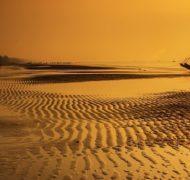God Undergirds All Work and Productivity (Psalm 107)
Bible Commentary / Produced by TOW Project
Psalm 107 relates human economic endeavors to the world of God’s creation. It is worth citing at length.
Some went down to the sea in ships, doing business on the mighty waters; they saw the deeds of the Lord, his wondrous works in the deep. For he commanded and raised the stormy wind, which lifted up the waves of the sea. They mounted up to heaven, they went down to the depths; their courage melted away in their calamity; they reeled and staggered like drunkards, and were at their wits’ end. Then they cried to the Lord in their trouble, and he brought them out from their distress; he made the storm be still, and the waves of the sea were hushed. Then they were glad because they had quiet, and he brought them to their desired haven. Let them thank the Lord for his steadfast love, for his wonderful works to humankind. (Psalm 107:23–31)
Then as now, people went to sea for fishing and trading. Their ships were fragile, and they had little warning before storms surged. Their lives and livelihood depended on the weather. Notwithstanding our technological advantages, we, too, depend upon a multitude of factors beyond our control in much of our work. Perhaps the most honest thing anyone can say about success at work is, “I was fortunate.” As Bill Gates remarked about the amazing success of Microsoft, “I was born at the right place and time.”[1] To the believer, “fortunate” is a term to describe God’s constant provision for our needs. Wringing success from the uncertainties inherent in our work depends a bit on skill (a gift from God in itself), a bit on hard work, and a lot on God’s providence. Whatever our “desired haven” in life and work, “let us thank the Lord for his steadfast love, for his wonderful works to humankind.” Perhaps James had this psalm in mind when he said, “You ought to say, ‘If Lord wishes, we will live and do this or that’” (James 4:15).
A bit later, Psalm 107 adds further insight to this.
God turns a desert into pools of water, a parched land into springs of water. And there he lets the hungry live, and they establish a town to live in; they sow fields, and plant vineyards, and get a fruitful yield. By his blessing they multiply greatly, and he does not let their cattle decrease (Psalm 107:35–38).
God creates the conditions for life to thrive on earth. He can turn a desert into a pasture (or a pasture into a desert). Agriculture, including sowing crops and managing livestock, depends on God-given growth. Where agriculture prospers, towns arise. With the emergence of towns every kind of work appears. The urban economy provides all kinds of goods and services to a growing and diverse population. In an ancient economy, in addition to farmers and shepherds, a community would need potters, metalworkers, and scribes (to record commercial agreements and transactions, as well as laws and religious texts). The whole economy of any city, past or present, depends upon agricultural abundance, whether home-grown or through trade. When the world’s farmer can grow more than his needs for his own subsistence, complex communities can thrive. And this comes from God, who waters the dry land (Ps. 65:9, Genesis 2:5).
Psalm 107 thus covers economic activity on both land and sea, and asserts that God is over it all. And God is not hostile to our work. The psalm speaks of how he saves and provides. Our livelihood depends upon God’s beneficent governance of natural forces.





